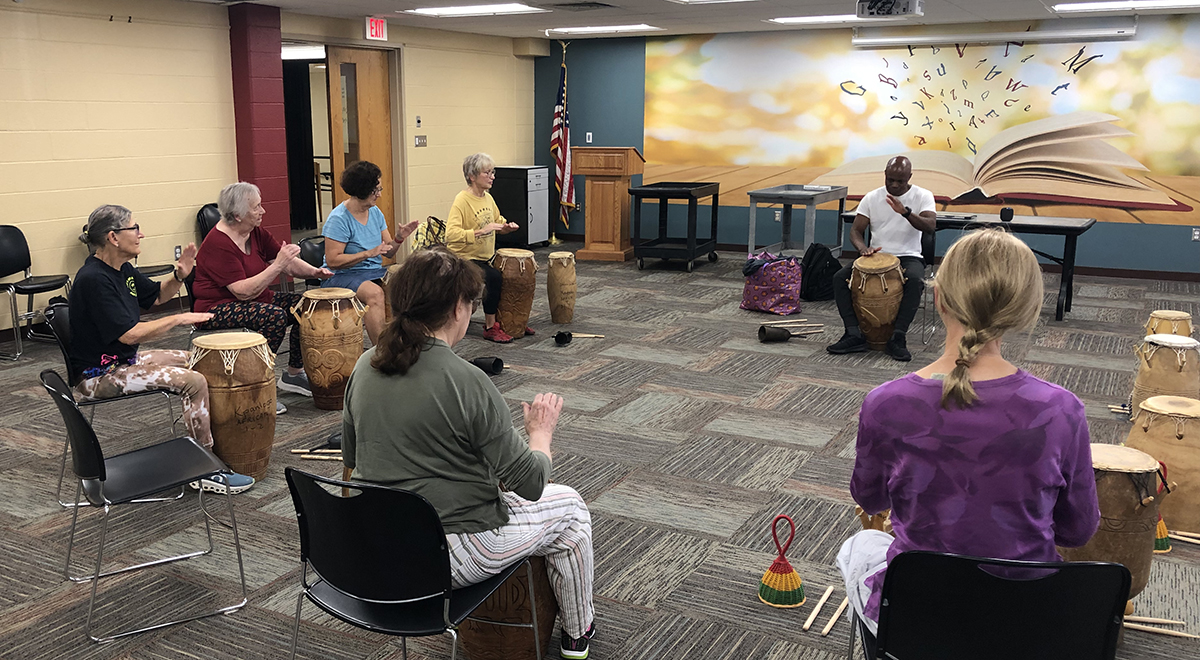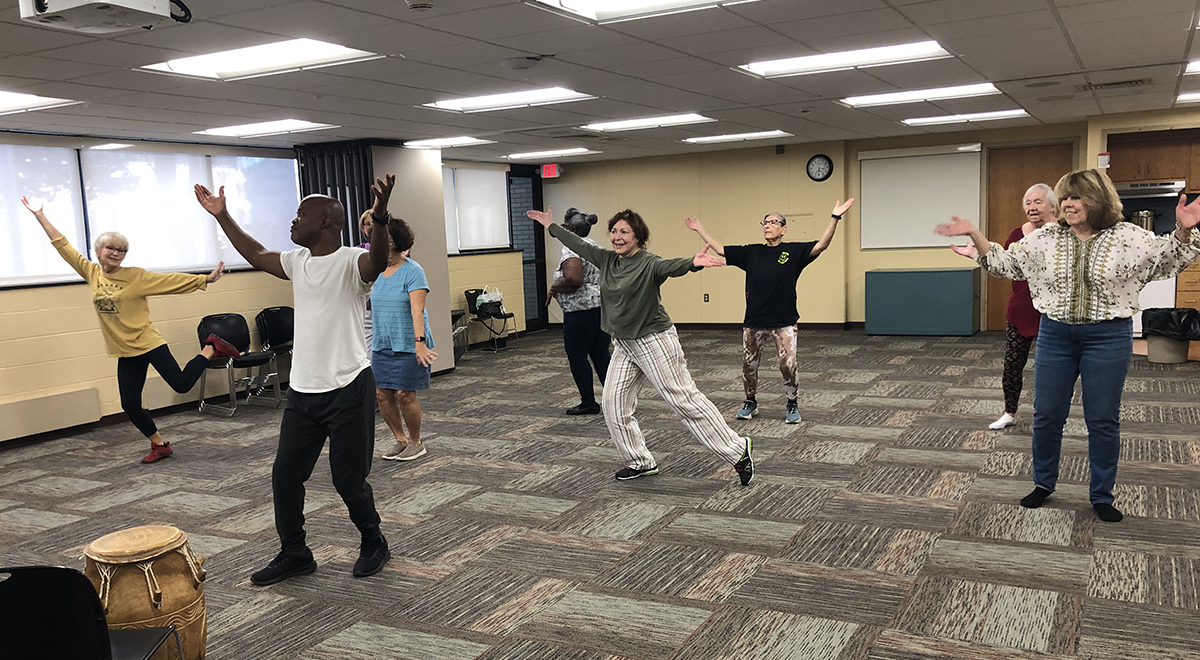Professor Teaches African Drumming and Dance to Local Community

Assistant Professor of Dance Iddi Saaka is teaching the fundamentals, history, and cultural importance of African drumming and dance to a group of adults over the age of 55 at the New Britain Public Library this fall.
His group gathers in the downstairs Stanley Works Community Room for 90-minutes on Thursday afternoons. Over the course of eight weeks, the library class is learning two Ghanaian recreational dances, “Kpatsa” and “Kpanlogo.” Saaka previously taught “Kpatsa” to Wesleyan’s Class of 2027 during their new student orientation “Common Moment” on Andrus Field the day after they arrived on campus at the end of August.
“We’re getting older but that doesn’t mean we can’t do these movements and feel uninhibited,” said one participant. “I think it should be mandatory,” said another student, wishing the class were available at every library in the state. “It’s awesome. I love this…It’s really fun and very exciting…This is absolutely great.”
The New Britain class, which draws participants from neighboring towns including West Hartford and Simsbury, is part of a Creative Aging Program to advance arts education programs for older adults in Connecticut public libraries. The program is presented in partnership with the Connecticut Office of the Arts, the Connecticut State Library, and New York-based non-profit Lifetime Arts.
“I hope he does it elsewhere,” said Betty Horne P ‘03 of Middletown. “It’s wonderful…as you age you need to keep thinking, you need to keep your focus and concentrate.”
In a semi-circle of 11 seats, nine participants start out sitting with African drums, shakers, bells, and drumsticks by their chairs. Saaka leads a 10-minute warmup, initially with just their right hand on the drum, slowly learning different strokes to produce a variety of sounds from the varying parts of the drumhead–from a high-pitched slap on the edge, to a low, resonant bass note from the center of the drum. The left hand follows next, and finally both hands are combined. Each sound is played 50 times. Next, Saaka leads the group to combine the three different sounds that can be fashioned from the drumhead into a single phrase, first with pauses between each technique, then a six-beat phrase with no pauses, gradually increasing to a faster tempo.

Over the next 45 minutes, a progressively complex pattern is introduced to the class. Saaka teaches a syncopated bell pattern using a drum stick for five minutes, then splits the group, with half playing a hand drum rhythm while the other half plays the bell pattern. An Ahatse, a Ghanaian percussion instrument with beads woven into a net covering a gourd, which Saaka refers to as a “rattle,” is added to the mix on each beat for another ten minutes.
For a half hour, the students alternate between these interlocking polyrhythms on drums, bells, and shakers. “We get together to have a good time, we get together,” Saaka says to remember the third rhythmic variation on the hand drum.
After an hour of reviewing the drumming patterns, Saaka performs a drum solo while his students keep their individual supporting patterns.
The drums are packed up, and the last 30 minutes of class is focused on dancing. The group dances in a circle after a warmup to recordings by Ghanaian musician and songwriter Kofi Kinaata, stretching the head, neck, arms, shoulders, and hips. Saaka vocalizes drum parts as he teaches each set of motions, with individual phrases combining steps, claps, and jumps corresponding to a cycle of 16 beats.
The class reviews the whole five-minute movement cycle, moving, hopping, and twirling, and clapping in a call-and-response with Saaka, who has moved to accompany the dance on his hand drum.
“Iddi is the best,” said one student. “We make joyful noise,” said another participant. “It is pure delight,” another person enthuses after class has ended.
Wesleyan students of Saaka and Assistant Professor of Music John Dankwa PhD ’18 will perform West African drumming and dance in the Center for the Arts Theater on Friday, Dec. 1, 2023.
The New Britain class, which is supported by a grant from the Greenwich-based Pasculano Foundation, will have a final sharing of what they learned on Wednesday, Dec. 6, 2023.
This semester, Saaka taught Wesleyan undergraduate students in “Introduction to Dance” and West African dance classes. In the spring semester, Saaka will be leading a Course-Embedded Experiential Learning class at Wesleyan, offered in conjunction with the Office of Study Abroad in the Fries Center for Global Studies. Students in “West African Dance III” will travel to Kobina Ansa, Ghana in March 2024.

